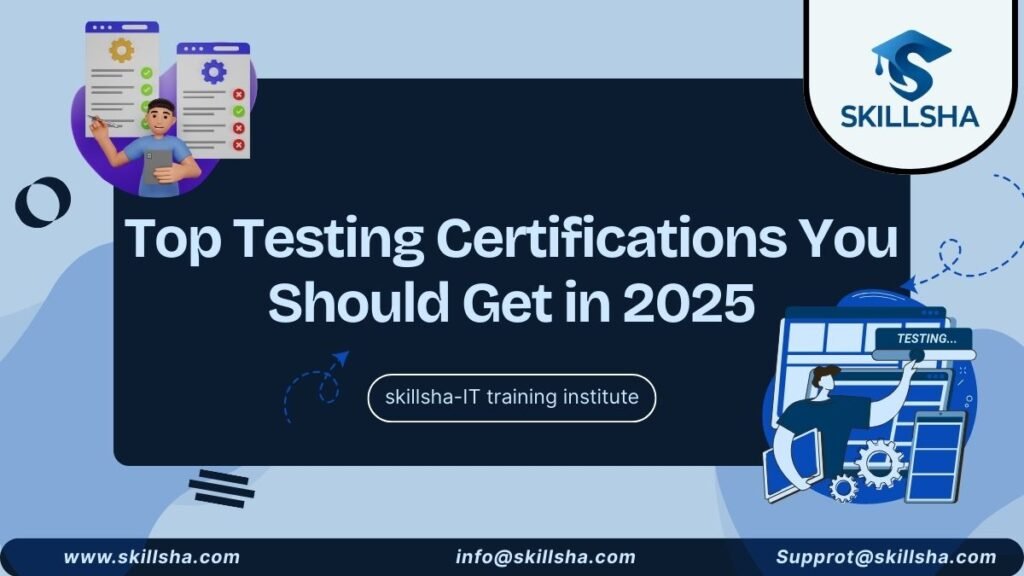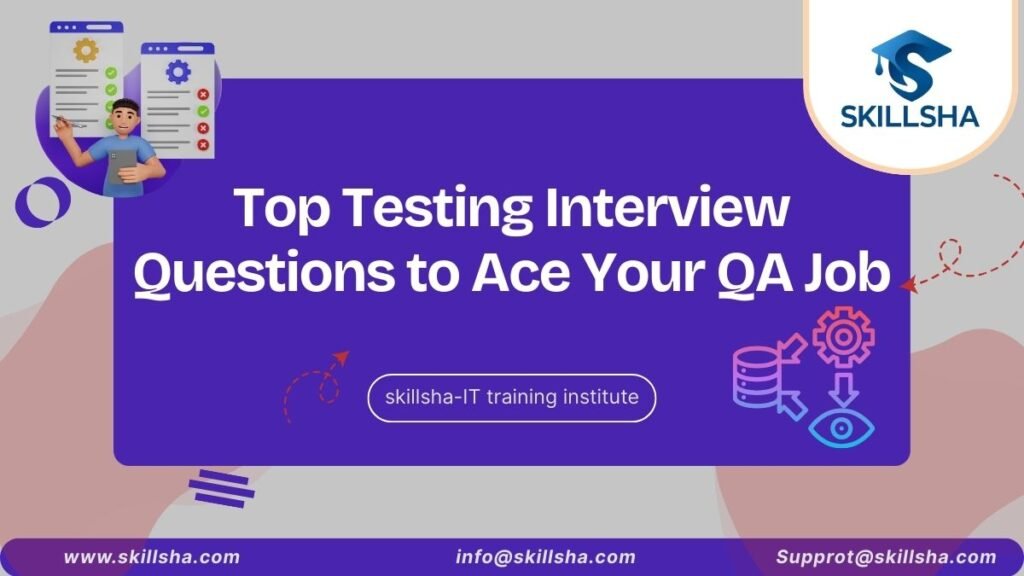And how to choose the ones that actually matter for your QA career
Let’s not sugarcoat it: getting certified won’t magically make you an expert. But it will help you stand out. Think of it as a way to show recruiters and team leads that you’re serious about your role, that you’ve done more than just click through tutorials.
Especially now, with teams demanding faster releases and smarter QA from day one, certifications can give you the structure and credibility to move ahead. But not all certs are worth your time or money.
Here’s the thing—some certifications teach real skills. Others are just expensive PDFs with your name on them. Let’s break down which ones are actually worth pursuing in 2025, and how to prep for them properly with support from places like Skillsha, where the training is focused, practical, and actually prepares you for what you’ll face on the job.
1. ISTQB Foundation Level
Best for: Beginners and manual testers who need a strong foundation.
This one is the go-to starting point. It’s been around forever for a reason—it works. ISTQB doesn’t teach you how to write Selenium scripts or test APIs. What it does is give you the mental framework for testing: how to think critically, plan test cases, and communicate bugs in a way developers actually understand.
If you’re new to QA or switching into it from another role, this cert is a solid way to prove you understand the basics.
Skillsha’s advantage: They strip away the jargon and walk you through real-world applications of these principles. You’re not memorizing terms—you’re learning how to apply them.
2. Certified Agile Tester (CAT)
Best for: Testers working in Agile or fast-moving dev environments.
Let’s be honest. Most dev teams claim they’re Agile. Few actually are. But either way, the expectations on QA have changed: less documentation, more adaptability, and closer collaboration.
This certification helps you test in sync with rapid dev cycles. You’ll learn how to make testing fit into daily stand-ups, sprint planning, and shifting priorities.
What makes it different: It focuses less on the tools and more on mindset, communication, and how to stay useful as everything around you changes every two weeks.
Skillsha’s take: You’ll do more than sit through lectures. Their CAT track puts you into simulated Agile teams and makes you actually work like one. It’s messy, challenging, and exactly what you need.
3. Selenium WebDriver Certification
Best for: Manual testers ready to start automating UI tests.
If you’re still only doing manual testing, it’s time to level up. Automation doesn’t replace manual QA—but it handles the boring stuff so you can focus on what matters.
Selenium is still the industry standard for automating web UI tests. A certification in it means you can write your own scripts, understand test frameworks, and contribute to any automation strategy.
Key skills you’ll pick up:
- Writing reusable test cases
- Debugging failed runs
- Structuring tests for maintainability
Skillsha difference: You’ll build a working Selenium framework by yourself. Not just watching someone else code. Real bugs, real failures, real learning.
4. API Testing with Postman and REST Assured
Best for: QA professionals who want to move deeper into backend testing.
Here’s the truth: testing just the UI is like checking the paint job on a car without ever starting the engine. APIs are where most of the business logic lives.
This certification proves you can go beyond surface-level testing. You’ll learn to test endpoints directly, verify data, chain requests, and write automation around them.
What you’ll do:
- Validate API responses
- Automate collections in Postman
- Test REST services with Java
Skillsha’s push: You work on real APIs, with test cases you’d actually see in production. No fake e-commerce apps with hardcoded responses. You’ll break real things and fix them.
5. Performance Testing with JMeter or k6
Best for: Testers on high-traffic apps or enterprise systems.
When your app slows down under load, users don’t wait—they leave. That’s why performance testing is so valuable.
With tools like Apache JMeter or k6, you can simulate hundreds or thousands of users and see where the cracks start to show.
Certifications in this space teach you how to:
- Create test scripts to simulate load
- Analyze response times and throughput
- Pinpoint bottlenecks in infrastructure
Why it matters: It’s not just about breaking things—it’s about helping developers know why they broke.
Skillsha approach: You’ll run performance tests against real apps and get used to reading ugly log files, weird spikes, and fixing test setups on the fly.
6. Appium for Mobile Testing
Best for: Testers focusing on Android/iOS apps.
Mobile testing isn’t just desktop testing on a smaller screen. You’ve got gestures, swipes, pop-ups, OS differences, and flaky networks to deal with.
Appium is the most popular tool for mobile automation right now. If you’re serious about testing apps on real devices, this cert helps.
What you’ll gain:
- Running scripts on simulators and devices
- Handling touch events and gestures
- Dealing with OS version fragmentation
Skillsha’s deal: You test on real devices. Not emulators. Not theory. Real phones, real bugs, and lots of crashing apps to fix.
7. ISTQB Advanced Level – Test Automation Engineer
Best for: Mid-to-senior testers scaling automation efforts.
You know how to automate individual tests. But how do you scale that to an entire suite? How do you manage test data, reporting, integration with CI/CD pipelines, and keep things maintainable?
This cert digs into that. It’s for people building frameworks, leading automation efforts, or mentoring juniors.
Topics include:
- Test architecture
- Tool selection
- Automation ROI and strategy
Skillsha layer: You’ll actually build automation infrastructure in teams. Not just solo scripts. They teach you how to think like a lead, not just a tester.
8. Certified Mobile Tester (CMobileT)
Best for: QA engineers in mobile-first companies.
If mobile is your core product (think e-commerce, fintech, or health apps), you need more than just Appium skills. This cert dives into real mobile behavior—battery usage, connectivity issues, GPS, camera, sensors, and more.
Expect to learn about:
- Network throttling
- UX considerations
- Cross-device compatibility
Skliisha’s mobile program: You’ll simulate low-bandwidth conditions, device rotation issues, and hardware integration problems that actually happen in the real world.
How to Choose the Right Testing Certification
Don’t try to collect them all like Pokémon. That’s not the goal. Choose one based on where you are in your career and where you want to go next.
Ask yourself:
- What’s my current weakness?
- What roles am I aiming for?
- Do I want to stay technical, go toward leadership, or become a specialist?
If you’re stuck in manual testing, pick Selenium or API certs. If you’re building automation but want to lead it, go for ISTQB Advanced. And if your team struggles with mobile or performance issues, start there.
Whether you’re just starting out or leveling up, enrolling in a software testing course in Noida can give you hands-on skills and help you decide which certification aligns best with your goals.
Bottom line: Certifications are not the goal. They’re a tool to get better.
Why Skillsha Actually Helps You Learn Faster
Here’s what most QA courses get wrong: they assume everyone learns by watching long videos and taking quizzes. That’s not how real learning works.
Skillsha builds their programs around actual QA workflows. You get feedback, live mentoring, real assignments, and exposure to the messy, broken parts of real-world testing.
Here’s why they work:
- Mentors are actual QA engineers, not course creators
- You get experience debugging, not just writing perfect scripts
- They prep you for interviews with mock rounds and scenario-based questions
You don’t just pass a test. You become the kind of QA engineer teams want to hire.
Final Thoughts
Getting certified in QA won’t change your career overnight. But it will help you move faster if you pick the right one and actually put in the work.
So choose based on what makes sense for your path. Make sure the training you get is worth your time. And if you want support that isn’t watered down or bloated with theory, Skillsha’s courses are built for people who actually want to get better—not just get by.
Start with one cert. Apply it. Then build from there.
That’s how real QA careers are made.
FAQ
Q1. What are the top testing certifications in 2025?
Some of the best are ISTQB Foundation, Selenium WebDriver, API Testing with Postman, JMeter, Appium, and ISTQB Advanced Level.
Q2. Which QA certification is best for beginners?
ISTQB Foundation Level is the best start for beginners as it covers testing fundamentals without heavy technical prerequisites.
Q3. Are automation testing certifications worth it in 2025?
Yes, with automation in demand, certs like Selenium and API testing help you stay competitive in QA jobs.
Q4. How do I choose the right testing certification?
Pick based on your career stage—manual testers can start with Selenium or API; advanced testers can opt for ISTQB Advanced.
Q5. How does Skillsha help with QA certification prep?
Skillsha provides hands-on training, real projects, mock interviews, and practical assignments to prepare you for real QA work.


